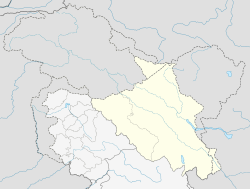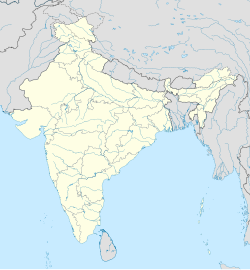Phobrang is a settlement in the Indian union territory of Ladakh. It is near Lukung on the way the Indo-China border at the Hot Springs. It is the last village of Ladakh in this direction, at an elevation of 14,500 feet (4,400 m).[2]
Phobrang | |
|---|---|
village | |
| Coordinates: 34°2′57″N 78°26′33″E / 34.04917°N 78.44250°E | |
| Country | India |
| Union Territory | Ladakh |
| District | Leh district |
| Tehsil | Durbuk |
| Area | |
| • Total | 3.16 sq mi (8.19 km2) |
| Elevation | 14,500 ft (4,400 m) |
| Postal code [3] | 194201 |
Phobrang is in the Leh district, Durbuk tehsil. It is the headquarters of a Halqa Panchahat (village administration), which covers the entire Pangong Tso region of Ladakh till Man Pangong.[4][5] Phobrang was apparently lightly populated in the 19th century,[2] but, at present, there is a small residential area, along with numerous semi-nomadic camping grounds, grazing grounds and farmlands, situated in an alluvial plain watered by a river flowing from the north. There is a Green Himalayas project under way to convert Phobrang to an eco-tourism site.[6][7]
The 84 km-long Marsimik La Road from Lukung to Hot Springs passes through Phobrang.[8] There is also a 40 km-long road from Phobrang to Chartse on the north bank of Pangong Tso.[9] Both these roads are meant for mainly military use.
References
edit- ^ "Phobrang". Google Maps.
- ^ a b c Drew, Frederic (1875), The Jummoo and Kashmir Territories: A Geographical Account, E. Stanford – via archive.org
- ^ "34°02'57.2"N 78°26'33.1"E". 34°02'57.2"N 78°26'33.1"E.
- ^ Village Amenity Directory 2016-17, Ladakh Autonomous Hill Development Council, Government of Jammu and Kashmir, 2016. page 29.
- ^ Man Pangong, villageinfo.in: Indian Village Directory, retrieved 4 June 2022.
- ^ Sharma, Seema (8 July 2019). "Three villages near Pangong lake in Ladakh witness social and economic transformation". The Times of India.
- ^ Green Himalayas: The Project, greenhimalayas.org, retrieved 4 June 2022.
- ^ Lukung to Hot Springs, OpenStreetMap, retrieved 4 June 2022.
- ^ Phobrang to Chartse, OpenStreetMap, retrieved 4 June 2022.

